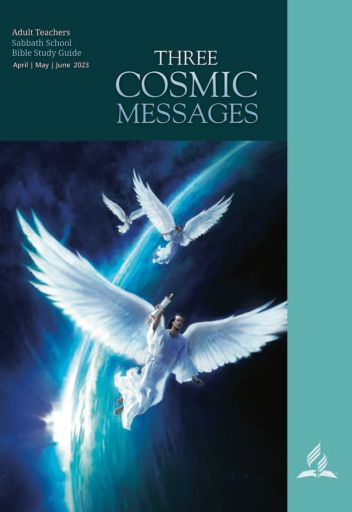
The Three Angels’ Messages
On October 15, 1844, one week before the Great Disappointment, a boy had been born into a pious Lutheran family in Germany. His name was Friedrich Nietzsche, who would become one of modernity’s most influential atheists. Believing that the Christian God was dying in the West, Nietzsche railed against the Christian religion’s continued moral influence, deriding it as a “slave morality,” the morality of the weak who, in an attempt to protect themselves from the stronger, concocted such silly notions as “Love your enemies.” For Nietzsche, modernity needed to get beyond antiquated notions of “good and evil”; a character in one of his books (Thus Spoke Zarathustra) declared, “Break . . . the old tablets!” (meaning, of course, the Ten Commandments).
The year 1844 was also important for Karl Marx, the founder of Communism. Called the “Economic and Philosophic Manuscripts of 1844,” this work had been written by Marx that year, even if not published until 1932 by the Soviet Union. The manuscripts show the early development of Marx’s ideology in which he argued for a totally materialistic reality that moved through various economic stages until the workers of the world would unite, overthrow their capitalist oppressors, and create a utopia on earth.
The year 1844 had been an important one for Charles Darwin, too. In what has become known as the “Essay of 1844,” Darwin produced one of the earliest expressions of his evolutionary theory, even if it was not then made public. Only in 1859, with the publication of On the Origin of Species, did Darwin publicly promulgate his view that all life on earth originated from a common ancestor by natural and chance processes alone.
The year 1844 was, however, the fulfillment of the 2,300-day prophecy of Daniel 8:14, and the same year that, out of the leftovers of the Great Disappointment, seeds were planted that would burgeon into a worldwide movement whose core message repudiated the guts of Marxist, Nietzschean, and Darwinian ideology.
Contra Marx, the Seventh-day Adventist movement proclaimed that the great controversy between Christ and Satan, not a materialistic flow of history, explained world history that would end, not in a human–made Communist utopia but in the supernatural establishment of God’s eternal kingdom.
Contra Darwin, the Seventh-day Adventist movement taught that life originated, not in the natural and chance process of random mutation and natural selection but by the power of the Creator God, who in six days created life on earth and rested on the seventh.
And contra Nietzsche, the Seventh-day Adventist movement proclaimed not only that God exists but that His universal code of morality (the “old tablets”), the Ten Commandments, remains God’s ultimate standard of judgment and binding on all humanity.
A coincidence that all these events happened in 1844? One should not think so.
Marx, Nietzsche, and Darwin are three influential figures whose work has caused humanity irreparable harm. But amid all these errors, God did not leave the world without a witness to His truth, which is why, amid these destructive ideologies, He raised up a movement that would, over time, morph into the Seventh-day Adventist Church and that would proclaim His last-day truth to the world—the three angels’ messages. These are messages that, at their core, refute the errors and misconceptions promoted by those three terribly deceived men.
The three angels’ messages are, in a sense, the marching orders of the Seventh-day Adventist Church. And at their core, they are the gospel, pure and simple, but the gospel presented in the context of “present truth” (2 Pet. 1:12, NKJV).
And this, the three angels’ messages, is our study for the quarter.
A native of Connecticut, USA, Mark Finley, an internationally known evangelist, was a vice president at the General Conference from 2005 to 2010. After retiring from full-time employment, he became an assistant to the president of the General Conference. Pastor Finley and his wife, Ernestine, have three children and five grandchildren.
© 2023 General Conference of Seventh-day Adventists®. All rights reserved. No part of the Adult Sabbath School Bible Study Guide may be edited, altered, modified, adapted, translated, reproduced, or published by any person or entity without prior written authorization from the General Conference of Seventh-day Adventists®. The division offices of the General Conference of Seventh-day Adventists® are authorized to arrange for translation of the Adult Sabbath School Bible Study Guide, under specific guidelines. Copyright of such translations and their publication shall remain with the General Conference. “Seventh-day Adventist,” “Adventist,” and the flame logo are registered trademarks of the General Conference of Seventh-day Adventists® and may not be used without prior authorization from the General Conference.
For questions and concerns about the Adult Bible Study Guide, please contact the Editor of the Bible Study Guide, Clifford R. Goldstein